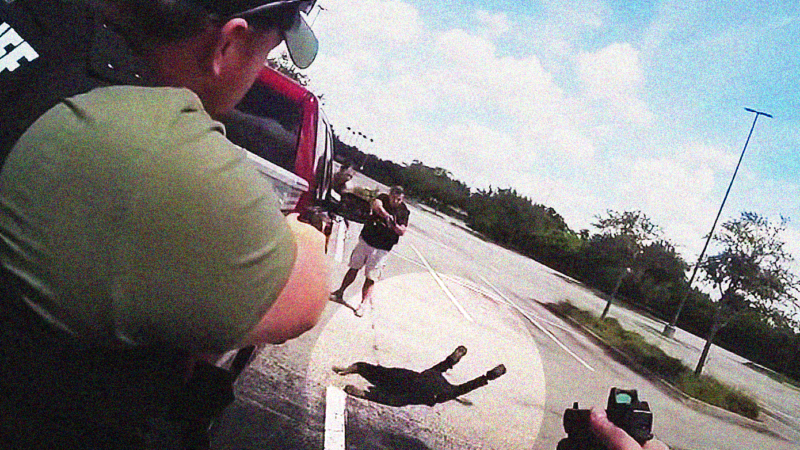
The family of a man who was shot in the back by a Florida police officer filed a civil suit in federal court Wednesday, alleging that Salaythis Melvin’s constitutional rights were violated when a plainclothes cop killed him in a parking lot as he ran away.
The lawsuit, filed by Michelin D. McKee, a representative for Melvin’s estate, seeks damages from Orange County Sheriff’s Office Deputy James Montiel, the shooter; four deputies who declined to immediately give aid to Melvin as he was dying; and Sheriff John Mina, for fostering what the suit says is a reckless culture where plainclothes units can “be mistaken for criminals.”
On August 7 of last year, officers with the Orange County Sheriff’s Office zeroed in on a group standing outside the Florida Mall. One of the men had a warrant out for his arrest.
That man wasn’t Melvin, who officers did not ID until after he’d been shot. The warrant was instead for Vanshawn Sands, who police sought to detain for possession of a firearm by a convicted felon.
“Mr. Sands possessed and used that firearm to defend himself when he was a victim of a drive by shooting in which the police cleared him of the shooting because they concluded that Mr. Sands use of the gun was in self-defense,” the suit claims. That case was dropped on June 14 of this year. “Because Mr. Sands had recently been the victim of a drive by shooting, Mr. Sands, Mr. Melvin, and the other individuals in the group immediately took off running for their lives thinking they were about to be attacked and shot at as retaliation for what happen with Mr. Sands.”
The cops were dressed in street clothes and body vests and were driving unmarked cars. One officer’s body camera footage shows Melvin falling to the ground after Deputy James Montiel shoots him in the back. A little more than a minute goes by before anyone renders him support.
“Keep your fucking hands down,” one officer yells as Melvin lies on the ground. More time passes, and he begins to writhe. “Get your hand down or you gonna get fucking shot,” one screams. Shortly after, he is handcuffed. Melvin later died.
Though the Orange County Sheriff’s Office did not respond to requests for comment, department incident reports reviewed by the local CBS affiliate contain an allegation from Montiel that Melvin possessed a handgun in his waistband. The body cam footage that captures the shooting did not come from Montiel—Sheriff John Mina says he had not been assigned one—and the officer wearing it is not close enough for the viewer to see a gun on Melvin’s person. According to a report from the Orange-Osceola State Attorney’s Office, the officer said he feared Melvin might shoot him because he turned his head as he was running.
“Based on what the video appears to depict, it’s hard to see how this could be a legally justifiable use of lethal force,” says Clark Neily, senior vice president for legal studies at the Cato Institute. “It is black letter law that police may not use lethal force to stop a person from fleeing unless the person represents an immediate danger to the officer or to the public, and I see nothing in this video that suggests Mr. Melvin represented a threat to anyone when the officer shot him.”
Those who want to sue the government for misconduct, like Melvin’s family, often run headfirst into qualified immunity, the judicial doctrine that allows state actors to evade civil liability if the exact way in which they infringed on a person’s constitutional rights has not been prohibited by a prior court ruling. Recent beneficiaries of qualified immunity include two cops who burned a suicidal man alive after they tased him despite knowing he was drenched in gasoline; a cop who shot and killed a man who’d been sleeping in his car; and more than two dozen cops who threw flash-bang grenades into an innocent, elderly man’s home during a SWAT raid gone wrong.
Whether or not the doctrine applies here will be fairly straightforward, notes Neily. “The only dispute should be a fact question about whether Mr. Melvin represented a threat to the officer or the public at the time the officer shot him. If yes, then the shooting will be considered justified and therefore not excessive force,” he says. “If no, then the shooting would be unreasonable and therefore a violation of Mr. Melvin’s clearly established right to be free from excessive force.”
Neily adds that the courts “can be quite creative in conjuring up qualified immunity defenses.” One such example: A cop who shot a 10-year-old while aiming at a nonthreatening dog received qualified immunity because no court precedent dictated that shooting someone while aiming at something else is unconstitutional. The U.S. Court of Appeals for the 11th Circuit passed down that ruling, which is the same circuit that will ultimately hear the Melvin estate’s suit.
Montiel is still on duty in an “investigative capacity.” The Orange-Osceola State Attorney’s Office has not announced whether it will bring charges against him.
Founded in 1968, Reason is the magazine of free minds and free markets. We produce hard-hitting independent journalism on civil liberties, politics, technology, culture, policy, and commerce. Reason exists outside of the left/right echo chamber. Our goal is to deliver fresh, unbiased information and insights to our readers, viewers, and listeners every day. Visit https://reason.com